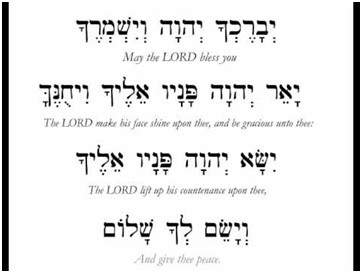This week in Torah we read the book of Naso – which has one of our most significant blessings:

Many Jews recite this blessing over the heads of their children on Friday nights before reciting Kiddush. It is a special moment in the family when parents come up to their children and acknowledge the circle of blessing they live within. The blessing originates as a Blessing of the Kohanim, the Priestly class, and today in more traditional synagogues on certain days the Kohanim are still called to raise their hands, separate their fingers, and recite this blessing over their congregants. It is a ceremony both mystical and profoundly touching.
This is also one of the many blessings/prayers that the early Christians took with them as they established their new Christian rites and rituals, and is recited to this day in most churches (though, usually not in Hebrew)!
Some of you may remember a parent or a grandparent reciting this blessing over your head on a Friday night. Memories such as these help define us as Jews, where we can feel in our “kishkes” resonances that on many levels feel inexplicable – and important, even if we can’t explain why.
The words of Naso, in offering this blessing, provides a template for asking a question that many have asked, “But, what about me? I didn’t grow up Jewish. I don’t have memories of Jewish Bubbes and Zayde’s and aunties bustling around me, making me blintzes, and asking me “to do a mitzvah and get my slippers,” How do I fit in to this sense of historical DNA consciousness? Is it authentic for me to treasure those story/memories that I personally don’t have? I get asked variations of this question quite frequently. These days as people are becoming more culturally aware, I have also been asked if conversion is actually a form of cultural appropriation!
My answer remains: examine your intent and your intention. If conversion is about the tchotchkes and the holidays, maybe you need to look a little more inwardly. But if you feel a depth of longing that will not be quieted, if you know with all your being that conversion is setting to rights what must be acknowledged, if becoming a Jew means you are now authentically who you were born to be – then this is not cultural appropriation. This is you living the life you were meant to live.
And that choice will bring some heartache, some bumps, and, occasionally, some disdain. But I am very proud to say, that here in Victoria most people who have chosen to become Jews do so in an atmosphere of welcome and deep appreciation. So we say to all, May God, bless you, May God shine upon you and be gracious to you, and May God’s shining be upon you, grant you peace and wholeness. Amen
Naso
May 25, 2020 by Rabbi Lynn Greenhough • From the Rabbi's Desk Tags: blessings, naso •
This week in Torah we read the book of Naso – which has one of our most significant blessings:
Many Jews recite this blessing over the heads of their children on Friday nights before reciting Kiddush. It is a special moment in the family when parents come up to their children and acknowledge the circle of blessing they live within. The blessing originates as a Blessing of the Kohanim, the Priestly class, and today in more traditional synagogues on certain days the Kohanim are still called to raise their hands, separate their fingers, and recite this blessing over their congregants. It is a ceremony both mystical and profoundly touching.
This is also one of the many blessings/prayers that the early Christians took with them as they established their new Christian rites and rituals, and is recited to this day in most churches (though, usually not in Hebrew)!
Some of you may remember a parent or a grandparent reciting this blessing over your head on a Friday night. Memories such as these help define us as Jews, where we can feel in our “kishkes” resonances that on many levels feel inexplicable – and important, even if we can’t explain why.
The words of Naso, in offering this blessing, provides a template for asking a question that many have asked, “But, what about me? I didn’t grow up Jewish. I don’t have memories of Jewish Bubbes and Zayde’s and aunties bustling around me, making me blintzes, and asking me “to do a mitzvah and get my slippers,” How do I fit in to this sense of historical DNA consciousness? Is it authentic for me to treasure those story/memories that I personally don’t have? I get asked variations of this question quite frequently. These days as people are becoming more culturally aware, I have also been asked if conversion is actually a form of cultural appropriation!
My answer remains: examine your intent and your intention. If conversion is about the tchotchkes and the holidays, maybe you need to look a little more inwardly. But if you feel a depth of longing that will not be quieted, if you know with all your being that conversion is setting to rights what must be acknowledged, if becoming a Jew means you are now authentically who you were born to be – then this is not cultural appropriation. This is you living the life you were meant to live.
And that choice will bring some heartache, some bumps, and, occasionally, some disdain. But I am very proud to say, that here in Victoria most people who have chosen to become Jews do so in an atmosphere of welcome and deep appreciation. So we say to all, May God, bless you, May God shine upon you and be gracious to you, and May God’s shining be upon you, grant you peace and wholeness. Amen